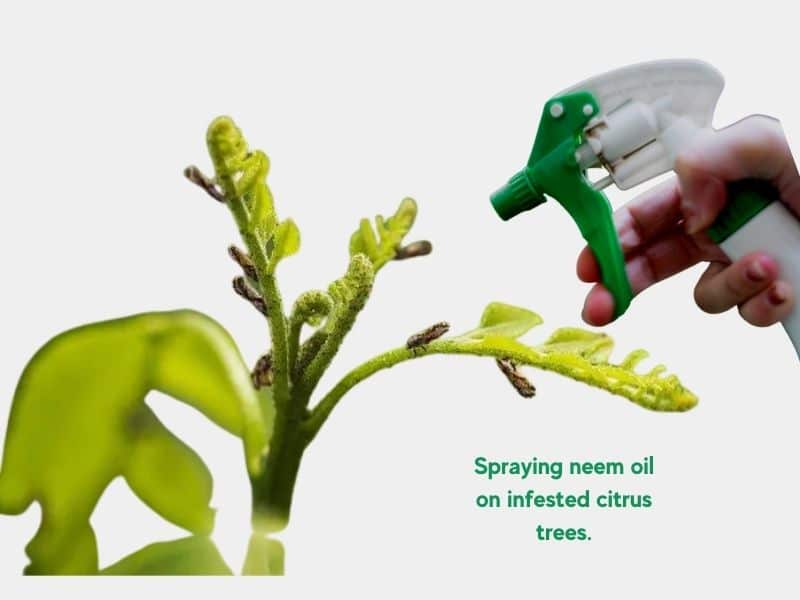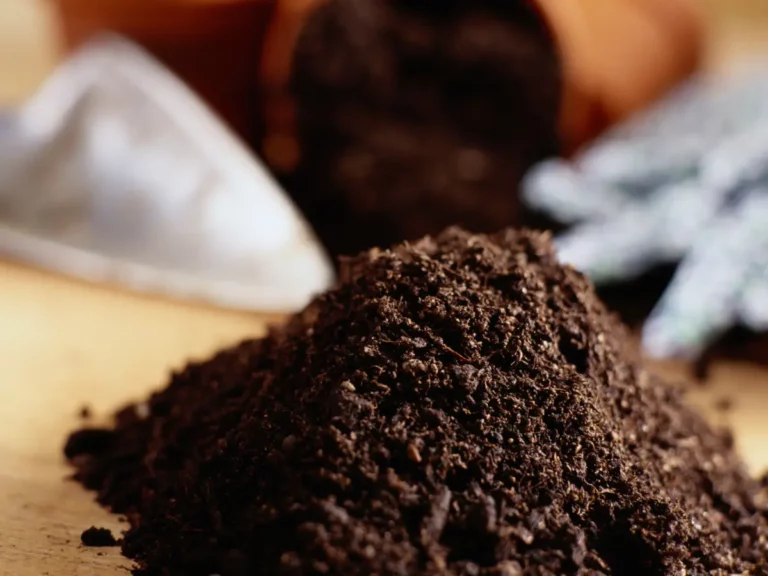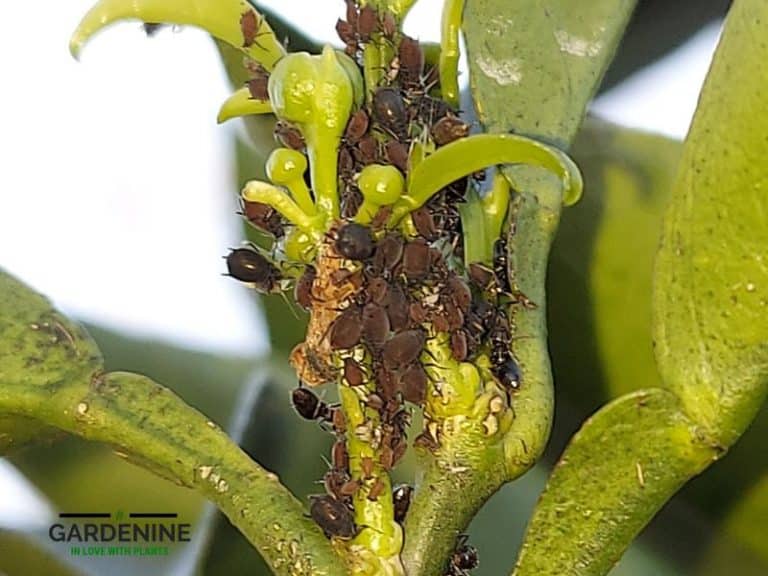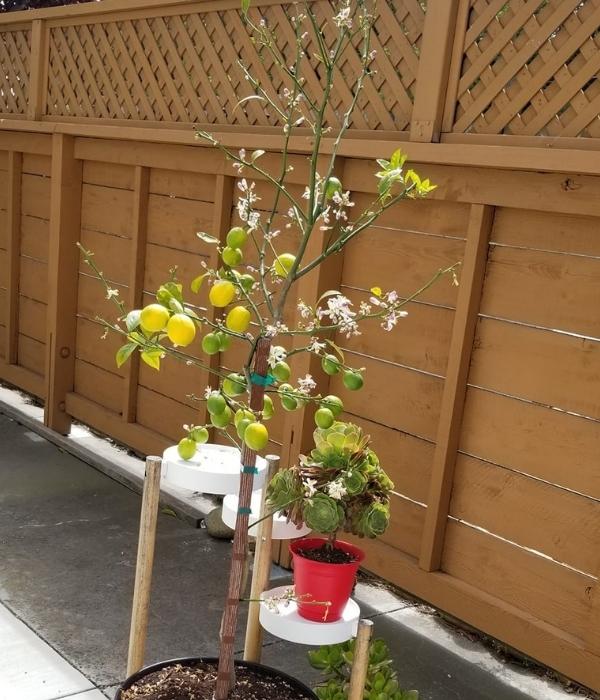How to Use Neem Oil for Citrus Trees
Neem oil is an invaluable extract that has significant benefits for other plants. You can use neem oil extracts as a natural solution to prevent and control pests, fungi, and nematodes on your plants. Since citrus trees are susceptible to a number of pests, you’ll find neem oil useful in their control.
Mix 2-3 tablespoons of neem oil with a gallon of emulsified water to make a natural insecticide spray for citrus trees. Spray the solution on citrus trees infested with aphids, thrips, whiteflies, bud mites, orange dog caterpillars, and brown soft scale. Repeat the treatment until all the pests are killed.

You can use a neem oil mixture on different varieties of citrus and lime trees (and other plant species) without worrying about toxicity issues. Plus, making neem oil at home is easy using only a few ingredients.
Contents:
Is neem oil safe for citrus trees?
Neem oil is safe for citrus trees as it is a natural pest repellent that won’t cause any side effects if used correctly. You can apply neem oil on citrus trees as an insecticide, pesticide, or fungicide. Neem oil is a great natural pesticide for common citrus tree pests. You can use it as a cost-effective, DIY, and organic remedy for pest prevention and control.
It may not be a good idea to spray the oil on young plants (less than a month old) or during hot days as the oil can cause sunburn on continuous exposure to direct sun. You also have to ensure that you mix your neem oil solution properly. Too much can cause the leaves of your trees to droop or even get scorched or burned. I’d advise you to stop applying neem oil if your citrus tree’s leaves start to curl and wilt.
How to use neem oil on citrus trees
Neem oil has numerous uses, making it an excellent choice for citrus trees. You can use neem oil to control bugs and promote the soil’s nutrient quality while maintaining a sustainable and healthy ecosystem that does not negatively affect helpful insects and nematodes.
Here are a few great ways you can use neem oil on citrus trees:
Use neem oil as an insecticide
Neem oil is an effective natural insecticide that can be used for both the prevention and control of insect pests such as thrips, mites, mealybugs, etc. The neem oil insecticide can be helpful in a DIY setup considering its ease of preparation and application.
Mix concentrated neem oil, liquid soap solution, and water. An adequate neem oil concentration percentage ranges from 0.5%-1% (although 2% is also acceptable).
- Pour the neem oil base into a mixing container. In choosing an amount, take into account the overall size of the surface you wish to spray. Start with small amounts and make more as you go.
- Add a teaspoon (or two) of liquid soap to the mixture and stir. (A liquid soap solution is used to mix and stabilize the oil-based compound).
- Add copious amounts of water. An ideal ratio is one teaspoon (4-5ml) of concentrated neem oil, one teaspoon (4-5ml) of liquid soap or silicon powder, and 1 gallon of warm water.
- Mix the concoction thoroughly. The presence (or absence) of small oil droplets on the surface will indicate whether or not your mixture has emulsified properly. An evenly yellow-white hue will also indicate proper mixing.
- Spray over affected surfaces, including the leaves, fruits, and branches.
Pro tip: Always conduct a patch test if you have any concerns about your concoction’s corrosive nature.
Unlike synthetic insecticides, Neem oil does not harm plants (or create a “death zone” that can harm beneficial insects or animals). Azadirachtin, an active ingredient in neem oil, affects crucial stages of insect development by inhibiting feeding, causing hormonal disruptions, and smothering.
The oil clogs the spiracles of insect pests and suffocates them till they die. It is highly effective against small immature insects that may be crowding on some parts of your indoor and outdoor plants. This natural spray can target and control citrus pests such as thrips, aphids, and bud mites. While controlling pests, it also helps prevent some common citrus diseases from your plantation or indoor plants.
Keep in mind, however, that neem oil does not work as fast as most conventional synthetic chemicals but instead takes about a week, depending on the prevailing environmental conditions.
Using neem oil as an insecticide is convenient, and you can have a homemade solution by blending key ingredients in predetermined ratios.
Pay special attention to sensitive sections such as the leaves, fruits, branches, etc. Spray the solution every 7-14 days (for young plants) and about once a month (for mature trees) to prevent an infestation from harmful insects that can rapidly spread and cause significant damage to your citrus trees.
The insecticide has a shelf life of about a year if left unopened. However, it’s best to use the mixture within 8 hours after preparation to maintain its punch.
Neem oil organic fertilizer
Neem oil also has some organic benefits to the soil. The compound is effective when controlling nematodes, insect larvae, and other pathogens that live in the earth close to the base of your plant.
You can also use neem oil as a foliar fertilizer, where plants absorb the essential nutrients directly through the leaves, stems, and other plant parts on application. Foliar fertilizers have modest concentrations of Nitrogen, Potassium, Calcium, and Magnesium, which keep plants healthy without having to depend on root-based translocation.
Add one teaspoon of neem oil concentrate and one teaspoon of stabilizer into a gallon of warm water. Mix the ingredients to make a uniform foliar fertilizer solution. Spray the solution on your citrus trees covering the foliage and stems to feed the plants.
Use neem oil solution during evenings or early mornings to reduce the impact of hot sun and harm to beneficial insects. It’s also advisable to spray your citrus trees at least once before blooming and once after the petals drop to effectively control the pests.
The fertilizer works quickly, and results might start to show after 2-3 days (especially on the leaves). You have to constantly re-wet the sprayed areas for about a week for the best results.
Commercially available Neem Cake is an organic fertilizer formed as a residue of neem oil extraction. The product appears as dark brown kernels available in solid, granulated, or liquid form. Using neem cake has numerous benefits for your citrus trees as it retains its antifungal/antibacterial properties while improving the soil’s nutrient quality.
To use neem cake as fertilizer, apply it to the soil and mix it in thoroughly than water the area to aid its absorption. Neem cake fertilizer is rich in Nitrogen, Phosphorous, and Potassium and also helps inhibit the process of nitrification (in which bacteria convert nitrites into nitrates, rendering nitrogen inaccessible to plants). The organic compound also has slow-release qualities, making it viable for gardens and tree orchards.
Neem oil for citrus mildew and fungi control
Neem oil is effective at killing mildew and fungus on citrus trees and other indoor or outdoor plants. Citrus trees are vulnerable to fungi attacks, including footrot, melanose, scab, greasy spot, etc.
Neem oil solutions can be used to prevent and control the spread of dangerous fungi on citrus trees. To promote resistance against fungal infections, prepare and spray a neem oil solution over the affected parts of the plant.
The oil works by creating a protective layer on the treated surface and preventing the germination and penetration of fungal spores to sensitive sections of the leaf/bark. The plants may also absorb azadirachtin (and other antifungal elements) either through the vascular system or the roots to form a systemic fungicide circulating within the plant’s tissue.
Drenching your soil is another alternative that can help control fungal infections, especially on the roots. Drenching involves preparing a neem oil solution and spraying the ground with the product until it becomes wet.
Spray your trees every 15 days during plant maintenance and about once a week when dealing with fungal infestations. Particularly effective in controlling root rot fungi (which can be hard to eradicate once established).
It’s best to combine foliage spraying with soil drenching as a preventative measure. You can also use neem cake organic fertilizer to supplement your plant’s nutrient needs while maintaining an organic, antifungal balance.
READ NEXT: Lemon vs Lime – What’s the Difference?
References
- Emma Erler, Landscape And Greenhouse Field Specialist, University of New Hampshire: What should neem be used for on plants?
- Estefânia V. R. Campos et al, Frontiers in Plant Science: Neem Oil and Crop Protection: From Now to the Future






![4 Types of Lime Trees [Varieties, Pictures + Identification]](https://gardenine.com/wp-content/uploads/2020/09/Types-of-Lime-Trees-Key-Limes-fruit.jpg)